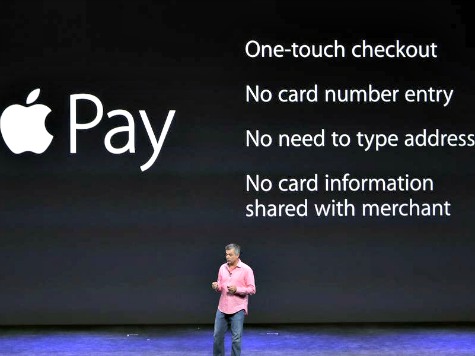
The highly respected Pacific Crest Securities downgraded Apple stock on September 10th, citing stagnant iPhone growth, “lack of compelling features” on the new Apple Watch, and not enough investment “potential for upside (earnings) estimates.”
As I wrote on September 9th, with “Apple Stock Loses $38 Billion In Just One Hour,” after the disappointment of iWatch, the only hope for a blockbuster is the subdued introduction of the “Apple Pay” service that intends to compete with PayPal, Google Wallet, and Amazon.
Following the less-than-inspiring introduction of iPhone 6, its wireless partners launched huge discount trade-in programs that must be heavily subsidized by Apple:
• AT&T will let customers trade in old iPhones for an iPhone 6 with a $300 credit;
• Sprint Corp. announced the “iPhone for Life” plan, which for $70 a month, lets users rent the iPhone 6 and upgrade to a new version every two years;
• Verizon Communications Inc. is offering a $200 gift to customers who trade in older models with a two-year contract, and
• T-Mobile says it will top the best trade-in price with an added $50.
Throwing this much cash at customers will help Apple and its wireless partners meet their sales goal. But the luxurious profit margins enjoyed during iPhone upgrades seems to be rapidly vanishing, unless the real game is leveraging iPhones for shopping.
Apple Pay’s biggest advantage is the 800 million iTunes accounts already in existence. This explains why Apple was able to strike partnerships with more than 80% of America’s credit card providers and why all the major retailers, ranging from Macy’s to McDonald’s, already signed on with the iconic Apple brand as an opportunity for mobile payments to finally eclipse cash and credit cards.
“With Apple, there’s a greater expectation that it’s going to be done right, and that it’s going to be easy,” Mark Schwanhausser, an analyst at Javelin Strategy and Research, told Silicon Valley News. “This could be a game changer.”
The Apple Pay service was unveiled on Tuesday September 9th, as a modest advancement compared to the iPhone and iWatch, in an extravaganza at the Flint Center for the Performing Arts. Using a radio frequency called near field communication (NFC), iPhones will sync payments through short distance data transfer to compatible store registers when the customer touches a fingerprint sensor.
Apple looks to make a middle-man profit on everyday transactions between consumers and retailers. Forrester Research predicts that U.S. mobile payments will reach $90 billion in 2017, a 48% compound annual growth rate from the $12.8 billion spent in 2012. Forrester believes that consumers will adopt NFC for “mCommerce” when it gets to be clearly better than the next best alternative.
During the National Retailers Association Big Show 2013, there were many vendors showing off NFC, including First Data, Ingenico, Isis Mobile Wallet, Marqueta, Natural Security, NCR, PayPal, Q-Thru, Revel Systems, and Wincor Nixdorf. These companies, and many others, promise to deliver solutions to provide a smarter, more convenient, more secure commerce experience for consumers and merchants.
Digital wallet providers have faced significant hurdles to changing consumer behavior to accept NFC, and merchants have had many other competing investment priorities. That is why the industry is so hopeful that Apple Pay gets greater coverage from Visa, MasterCard, and American Express, as well as the nation’s major banks, than Google Wallet did almost two years ago.
Apple is betting that customers are ripe for the technology innovation. The hundreds of millions of people who already have their credit cards registered with iTunes will be able to seamlessly start using Apple Pay immediately with iPhone 6.
Apple executives dismissed current payment systems as time consuming and inefficient during a video product introduction at the Flint Center for the Performing Arts. CEO Tim Cook promised, “Apple Pay will forever change the way we pay for things.”
Besides selling iPhones for less than cost as a way to get a lot of Apple Pay opportunities in the hands of tech savvy consumers, it is expected that Apple will also start a loyalty rewards program to stimulate NFC usage. But once again, Apple would have to throw away profit in the hope of building for the future.
Executives made a special point of highlighting the security features of the Apple Pay, including a credit card token chip that is embedded in iPhones that will not require transfer from Apple iCloud accounts, such as those that were recently hacked to steal and publicize celebrity sexting of nude photos and videos. But privacy advocates are already warning that to make a purchase with their iPhones, consumers will have to register their fingerprint with Apple’s Touch ID technology on the problematic iCloud.
The upside in Apple Pay is being used to justify why Apple and the wireless carriers are so willing to give up big profits today for the hoped-for greater riches in the future. But if this strategy does not turn out to be a blockbuster, the cool factor that has driven the Apple brand is going to fade very fast.
Chriss Street suggests that if you are interested in technology companies please click on: TESLA’S BAIT AND SWITCH TO NEVADA FOR GIGAFACTORY

COMMENTS
Please let us know if you're having issues with commenting.